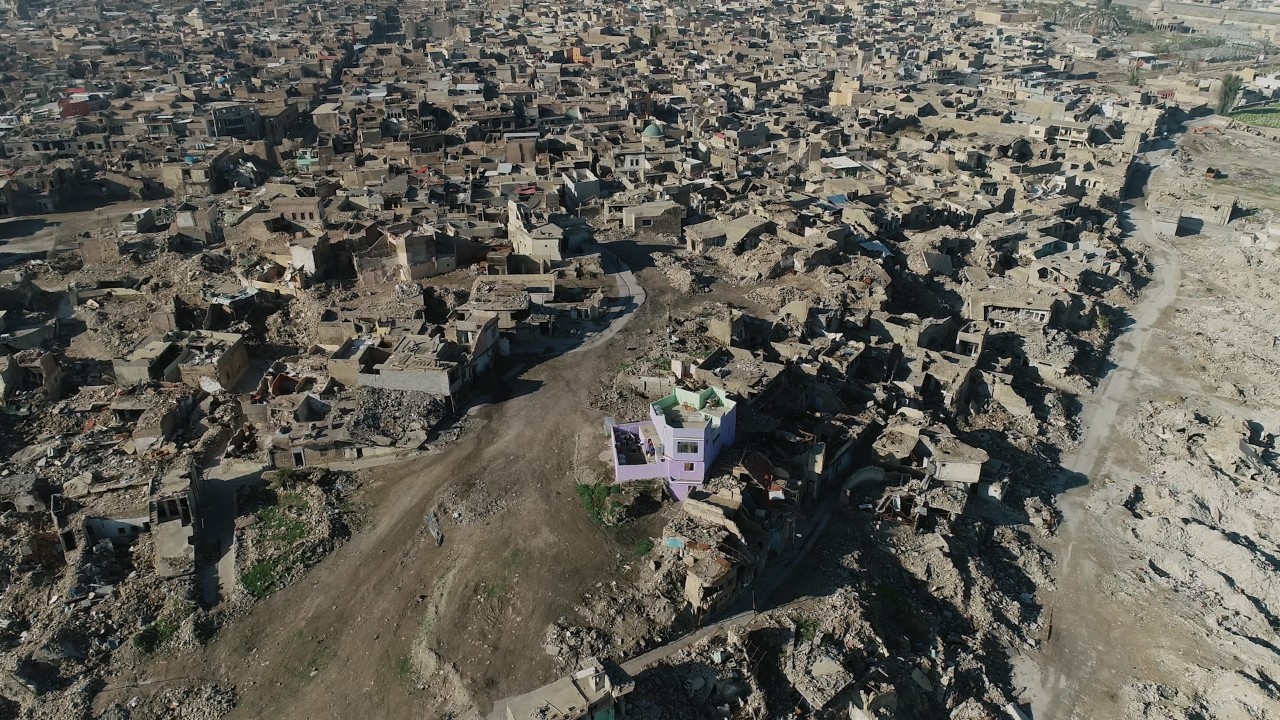Stella Martany walks through Mosul's Old City, near the Great Mosque of al-Nuri in November, 2018. (Photo by Rebecca Gibian). Social image courtesy Stella Martany
The first time Stella Martany went to Mosul, Iraq, she was 22 years old. It was 2016, and the Islamic State had occupied the city for two years. The offensive to liberate the place was underway, and Martany, an Iraqi living in nearby Erbil, had been commissioned by a journalist to take him to the former ISIS stronghold.This was Martany’s first introduction to being a fixer, a war reporter's best and most valuable tool. Often a local journalist or nonprofit worker, a fixer is hired by a reporter to help with key aspects of a story, such as translation, transportation, and sometimes even life-saving advice and guidance.To enter Mosul, Martany, the driver she’d hired, and the journalist had to go through a checkpoint held by Iraqi soldiers. The group pulled in right after an ISIS suicide bomber had blown himself up. An Iraqi soldier saw the man coming and ran to bear hug him, sacrificing his life to prevent more causalities, she recalled.“Other soldiers were crying, and there were blood and body parts scattered around,” Martany told me this past November, while eating kebabs at a restaurant in Erbil. “I remember one of the soldiers pointed at a dismembered hand laying in the street and told me, ‘That’s my brother’s hand.’”

The whole area was soon under fire, as ISIS drones carrying grenades arrived at the checkpoint, and the Iraqi soldiers there started firing back at them, Martany continued.“I’ve seen ISIS fighters and injured soldiers and civilians, people dying, but that day, I was the closest to be killed,” she said.Two years later, Martany might come off as your average millennial at first impression. She’s constantly on her phone, incredibly clumsy, and not above getting overly invested in a game of beer pong. But as one of the few female fixers in Erbil, Iraq, she’s also developed a reputation even among the notoriously cold-blooded—and male-dominated—foreign correspondent set for fearlessness.Among other trademarks, she’s stopped hiring drivers, instead ferrying journalists to their destination in a little red car while smoking cigarettes out the window."Stella is a badass," Louise Callaghan, a Middle East correspondent for the Sunday Times who has worked with Martany in Iraq, said via Facebook Messenger. "She's incredible at her job—always able to stay calm and objective no matter what is going on. She gets a lot of crap for being a woman in this job, but she has kept going anyway and proven a lot of idiots wrong."When ISIS occupied Mosul in 2014, Iraq’s second city but the largest ever controlled by the extremists, Martany was working at an nonprofit organization, helping get the NGO access to camps and doing psychosocial work with women who’d been through trauma. She had suspected she’d be a good fixer, a role she became familiar with through friends. She also wanted to be in Mosul, a place she had never seen before the war, to “understand what was happening."The fight for Mosul’s liberation started in October 2016. And despite the danger she faced taking journalists to the city and the frontlines, Martany, a Christian who already spoke four languages (Arabic, English, Kurdish and Assyrian), started fixing for journalists a few months later. She quickly realized she was passionate about the work.“There’s something common between me and my other fixer friends, we love our job,” she told me. “We love what we’re doing and we know that no one else can do it, only fixers.”In her two years of fixing, she described facing a lot of skepticism for being a woman in that line of work, even as she gained more and more respect and connections in Mosul, Erbil, and the surrounding area. She’s even come across journalists who were spooked by her tenacity: Once a reporter who had hired Martany decided she didn’t feel safe with a female fixer and found a man to take her into Mosul instead. When, later that day, the journalist saw Martany in the Old City of Mosul, near the Great Mosque, she was visibly shocked to see her.“It’s ridiculous, I see people who are like, ‘How do you go to Mosul, I do not dare to go there, I cannot go for one minute, I will be killed,’” Martany told me.Not everyone questions her ability, of course. Christian Stephen, a writer, journalist, and filmmaker friend who put Martany on my radar, told me he thinks “one of the greatest things about Stella is that in the small world of fixers in Iraq, she more than holds her own, despite it being quite a masculine-heavy arena—and though gender has no bearing on her ability or competence, it does give her an intuitive and compassionate edge that we’ve found invaluable.”“She is respected in the community as much as any man, and for good reason,” he added.Claire Thomas, a photojournalist based in Erbil, Iraq, told me on Facebook Messenger that she has “no hesitation” in hiring Martany for any assignments. “I have complete trust and confidence in her ability to not only help journalists get the story, but to do so in a safe, relaxed, and well-organized way,” she said.Born in Ankawa, the predominantly Assyrian suburb of Erbil in Iraqi Kurdistan, Martany’s family is from Shaqlawa. She has a supportive family life, and lives with her parents and sister in Erbil, while her brother lives in Australia with his wife. Her dad was in the army for 11 years, and now he and Martany’s mother both work in Kurdistan.“My dad always wanted us to grow up tough, to not be weak. He has witnessed very tough times and he was always worried that we wouldn’t be able to take that if it happens in our times,” she said. “My dad is very proud that I work like this. And my mom, when she’s asking me when will I get married… I tell her, ‘Find me someone as strong as me and I will marry them, I promise.’”Matany has changed her ways slightly since the high-profile killing of Tara Fares, an Iraqi model and fashion blogger who was fatally shot in a Baghdad street. She told me that since then, she no longer feels safe even on days she is not fixing, and doesn’t drive home alone late at night.But when I asked her if all this dangerous work and trauma weighed on her, she pondered for a minute, before noting that hearing people’s stories gave her perspective on the life she gets to live.“I feel very thankful for all that I have, I feel very grateful every time I go to Mosul,” she explained. “I felt it the first time I went and I feel it every time I go. I imagine what has happened there, I feel very sad for them, I feel very bad because I cannot help everyone or do something for everyone. But once I enter Erbil, I think, ‘Oh my God, thank you, thank you for giving me such a good life.’”Martany glanced over at me as she finished her thought. “It has affected me, sure, but I think it has made me stronger, not weaker.”Sign up for our newsletter to get the best of VICE delivered to your inbox daily.Follow Rebecca Gibian on Twitter.
Advertisement

The whole area was soon under fire, as ISIS drones carrying grenades arrived at the checkpoint, and the Iraqi soldiers there started firing back at them, Martany continued.“I’ve seen ISIS fighters and injured soldiers and civilians, people dying, but that day, I was the closest to be killed,” she said.Two years later, Martany might come off as your average millennial at first impression. She’s constantly on her phone, incredibly clumsy, and not above getting overly invested in a game of beer pong. But as one of the few female fixers in Erbil, Iraq, she’s also developed a reputation even among the notoriously cold-blooded—and male-dominated—foreign correspondent set for fearlessness.Among other trademarks, she’s stopped hiring drivers, instead ferrying journalists to their destination in a little red car while smoking cigarettes out the window.
Advertisement
Advertisement
Advertisement
